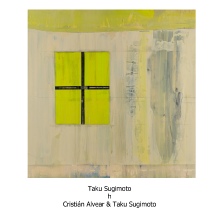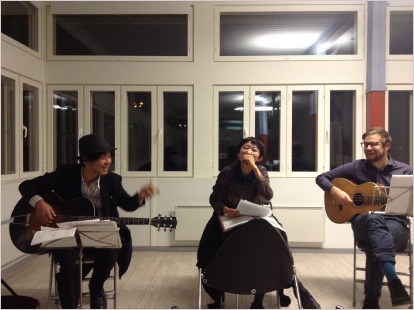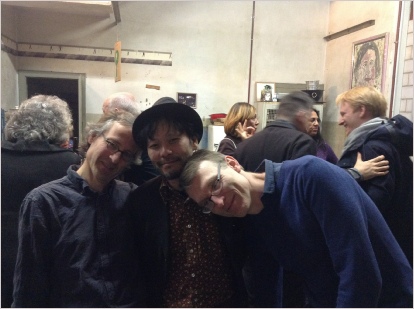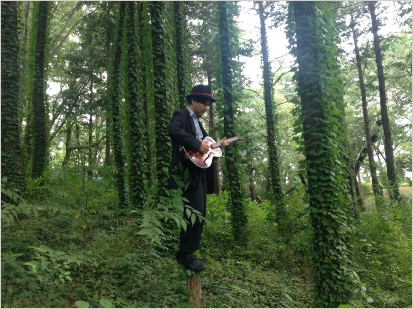Another Timbre TimHarrisonbre

at122 Taku Sugimoto - ‘h’
Cristián Alvear & Taku Sugimoto (guitars)
Duration: 40:25
Recorded live in concert at Ftarri, Tokyo, November 2017
Interview with Taku Sugimoto
The full title of your piece is 'h, version for two guitars, from Songs'. Could you explain that title, and how the performance with Cristián Alvear came about?
This piece was originally composed for ‘Songs’, a duo project with Minami Saeki, a female singer who I have been working with recently, when we had a tour in Europe last October. The piece, ‘h’, was actually completed in an airplane flying from Denmark to Finland where we were to have some concerts. We simply needed a new song (or more) which would be different from what we had played on the tour, because we’d become bored with repeating the same things.
I’ve become less interested in giving the pieces I compose particular titles, so some pieces in my oeuvre have the same titles, for instance, Trio, Quartet, Quintet, and so on. The titles of the pieces I write for ‘Songs’ are especially simple: a, b, c…, or I, II, III…, or 1, 2, 3…
For the concert with Cristián Alvear at Ftarri in Tokyo, I didn’t (or couldn’t) write a new composition. Instead, I thought it could work if we played some pieces from ‘Songs’ with two guitars, particularly ‘h’, since all the melodies or phrases which are repeated consist of the tones of guitar harmonics (i.e. just intonation).
I’ve known Cristián for years. He had already played some of my guitar pieces in the past, and I like his interpretations a lot.
Your Wikipedia entry states that: “Around 2002 his music became increasingly abstract, all but eliminating melody and featuring extended periods of silence.” In fact there is hardly any silence in ‘h’, and there’s a lot of melody. How would you characterise your recent music?
Yes, I am very interested in melody and pitch now. Even when I compose a piece for non-pitched percussion instruments, what I want to hear and listen to first is the pitch inherent in those instruments.
Recently I’ve become interested in composing pieces that have only melodies, and are free of any chords, or progression, or steady rhythm. In those pieces, notes are written without stems, only suggesting that tones should last longer or shorter, and the number of times a melody or phrase should be repeated is not determined, so that not only different tones but also different phrases can overlap, like a casual counterpoint.
You can notice all the above characteristics when listening to the recording of ‘h’, but the piece itself is written as monophony.
However, these pieces, including ‘h’, can be played differently. Often I ask the musicians to play the melodies more or less together, and the results usually satisfy me. I think it’s better that these kind of monophonic pieces remain open in the same way that a piece of western medieval music can be played differently by different interpreters.
I often think that some pieces I compose these days are no longer avant-garde. I am happy if people find something new in my compositions, but at the same time I feel I am trying to make music which could have existed many centuries ago. My recent music seems to have almost nothing to do with western classical music after medieval times or before Cage.
Do you think that your new interest in pitch and melody is part of a general current within experimental music in Japan, or indeed worldwide?
I hardly think so. Musicians I know tend to make use of electronics or a computer or some such in order to make textural music. The same can be said of musicians who play acoustic instruments, though instead of electronic devices, they use various extended techniques that they have developed.
Most of the musicians I know are improvisers, but I think this emphasis on the textural aspect of music is dominant worldwide within the field of experimental music. Many musicians who ask if they can work with me play music of this type. Of course, I have nothing against their music, but nonetheless, I often have to say “I am sorry”.
The aspects that interest me most in recent experimental music are the work of composers who are using just intonation, but in different and individual ways. For instance, composers such as Catherine Lamb and Chiyoko Szlavnics seem to focus on the spectrum of sound (difference tones, beats etc) rather than the so-called pure intervals, which is what advocates of just intonation often claim is what makes it better than any other tuning system, particularly twelve-tone equal temperament.
There are some exceptions, but most composers who advocate just intonation seem to work in the vein of contemporary classical music. They just want to refine their musical tools. But for me it can be interesting to go in the opposite direction. For instance, having tones that are utterly out of tune is also interesting to me, much better than strict allegiance to the idiom.
Your answer suggests that you feel rather isolated musically in Japan. Perhaps in Europe there are more musicians who share your interests in melody and just intonation. It must be hard if you feel that you are having to work against the grain even within the experimental music scene. Do you get discouraged?
Yes, I am isolated both musically and socially. It has always been so.
In Japan, I have very few concerts unless I organise them myself. I very rarely get a paid concert or a musical job: not more than twice a year, normally zero.
It’s almost impossible here for musicians who play experimental music to make their living only by music. I’ve been working as a part-time cleaner for 25 years. And beside this I have taken on more than ten different kinds of part-time jobs to support my living. A musician who I’ve known for 30 years still makes his living by juggling several part-time jobs. He sometimes has to do three different jobs within a day: one in the morning, the next in the afternoon, the last early in the evening, then finally a concert at night. For me it’s difficult to survive like that now. It’s too hard to manage. My friend sometimes looks really tired. I don’t want to do such jobs any more except the cleaning job (though that business has itself become depressed now). Instead I want to concentrate on music. So I am very poor now. Just to survive I’ve had to sell what I had: musical instruments, CDs, books, and whatever else can be sold. I have no stereo, don’t own a computer, or a phone, and, of course, I have no paid musical job. Often I even have to pawn my guitars. The older I get, the poorer I have become. Nevertheless I don’t want to work only for money. And I need time to do my music.
Sorry, I might have changed the subject. But I don’t mind the situation. I’m simply doing what I want or have to do. Luckily, there are always a few people who are interested in my work. There are also a few musicians who share my interests, so I am happy to work together with them regularly both as a composer and an interpreter. I am still interested in improvisation and play improvised music with them too.
It is perhaps true that I am a solitary person (or maybe I have made myself so in order to survive without adapting to society). I don’t want to belong to anything. But this doesn’t mean I am a misanthrope. I am always happy when I am with friends. I also love my Wandelweiser friends: Manfred, Stefan, Radu, Michael, Antoine among others. They are very generous and open. I sometimes feel as if they are beside me. What I have learned through working with them is that though each composer is strongly individual both musically and in their character, they often work together, which can be a model of democracy.
But I think yes, as you suggest, in Europe there are more people who share my interests, especially regarding pitch and just intonation. I have begun to think more and more that I should live in Europe, but I have no idea how to achieve that.



with Minami Saeki and Lauri Hyvärinen
Taku Sugimoto alone
with Stefan Thut and Manfred Werder
Reviews
“Sugimoto's winning project with singer Minami Saeki, Songs, is the source for this lovely, oddly static work, performed in tandem by the composer and guitarist Cristián Alvear. While those piece were generally short (song length), here Sugimoto takes one, 'h', and elaborates on it for more than 42 minutes. "Elaborates", however, in his own idiosyncratic style.
It's a live recording, from a concert at Ftarri in November 2017, and there's an immediate and welcome sense of the music being embedded in the local atmosphere. The notes come slowly, softly, very songlike, a gentle unhurried cascade of single notes, each player (one presumes) playing the melody at his own pace, allowing new patterns to emerge. That said, there's a kind of hovering stasis in effect, a circulation and rotation around one small but beautiful set of notes, the music never traveling very far at all, but simply observing what can occur given two extremely sensitive instrumentalists approaching the score with high regard.
It's been fascinating to hear Sugimoto's migration from the minimal but "tuneful" music first heard, by me, on 'Opposite' from 1998 to the extraordinarily spare recordings from the mid-2000s (like 'Live in Australia) to the more severe composed pieces from recent years to these current variations, which perhaps harken back to 'Opposite' but with much knowledge gathered int he interim. Not too much more I can say about it in terms of descriptives, only to strongly advise, if you've any interest at all in Sugimoto's music (and Alvear's brilliant playing) to hear this one. Very special.”
Brian Olewnick, Just Outside